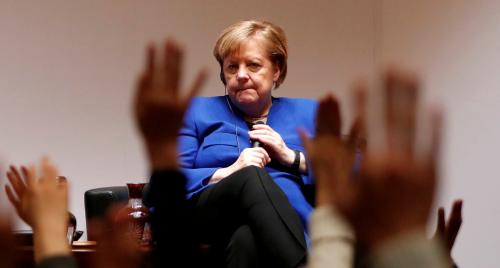The AfD’s stunning success in two regional elections in east Germany is a flashing warning sign to all German democrats both to address the concerns of their eastern fellow citizens and to realize the threat to liberal democracy that the party poses as it becomes overtly more radical, argues Constanze Stelzenmüller. This article originally appeared in the Financial Times.
When West and East Germany reunified in 1990, former Chancellor Willy Brandt told a jubilant crowd, “now what belongs together will grow together”. Nearly 30 years later, it seems as though the opposite is happening.
Exhibit A: the surge of the far-right Alternative for Germany, whose party program describes Germany’s constitutional order as “an illegitimate state of affairs.” Its leaders regularly claim that they are the only real torchbearers of the peaceful revolution of 1989. And while many of them were born in West Germany, its biggest electoral successes are in the east.
The AfD was created in 2013 by euroskeptics critical of Germany’s bailout of Greece after the global financial crisis. As the crisis waned, the movement nearly fizzled out. The arrival of nearly a million refugees in 2015 helped it morph into a xenophobic, nationalist party. It took seats in all the state parliaments, and gained 12.6 percent of the vote in the last federal elections in October 2017, becoming the main opposition party facing Chancellor Angela Merkel’s grand coalition.
At the national level, the AfD has since been yo-yoing between 12 and 15 percent in the polls. Yet the averages hide a stark divide. In the 11 western states, it peaked at around 15 percent at the height of the national debate about immigration, and now flatlines at less than one in 10 of all voters.
But in the five eastern states — the former communist East Germany — it nets double that or more. In fact, it is competing to be the dominant political power in the east.
On September 1, the AfD achieved a stunning second place in two state elections, taking 27.5 percent of the vote in Saxony, and 23.5 in Brandenburg. In Thuringia, which votes next on October 27, polls have the AfD neck-and-neck with the ruling hard-left Die Linke. The latter, successor to East Germany’s communist party, is petering out as the east’s homegrown political force. The AfD appears to be replacing it.
This is all the more remarkable because, while Die Linke once won voters with pragmatic problem-solving, the AfD has performed poorly in state legislatures and municipal governments. It has little to say on policy issues. Instead, it has been consumed with vicious public infighting, in which the party’s hardline “Wing” faction has swiftly been gaining ascendancy.
Andreas Kalbitz, one of Wing’s leaders, has longstanding connections to rightwing extremists, identitarians, and neo-Nazis at home and abroad. Björn Höcke, the AfD’s top man in Thuringia and one of its main ideologues, told a nationalist meeting last year: “The question for us today, dear friends, is not [to be] hammer or anvil, but sheep or wolf. And I, dear friends, say we decide: wolf.” Many Germans would recognize this as an allusion to a famous quote from Adolf Hitler’s propaganda minister Joseph Goebbels: “We come not as friends, nor as neutrals. We come as enemies! We come like the wolf who breaks into the herd!”
What makes a quarter of east Germans vote for such a party? Not the economy: Data as well as opinion surveys show that the east-west gap is closing. Not immigration: the uncontrolled influx of migrants has long stopped, and of the one million who were admitted in 2015, most were settled in the western states.
The causes of eastern alienation go deeper, and some deserve more empathy than they are getting. Easterners are more likely to say that west Germans are too dominant in politics and business, and that they feel like second class citizens.
Many older, less educated or skilled easterners felt left behind by the millions who moved westwards after reunification in search of better lives — or condescended to by the westerners who moved eastward to close down factories and take over the running of institutions. More than a few felt Syrian migrants in 2015 were given a warmer reception than they had received in 1989. And many worry that accelerating social change will change their lives for the worse.
But there are darker reasons, too. East Germans express greater skepticism of liberal democracy and market capitalism. Exit polls in Saxony showed nearly three-quarters of respondents voted for the AfD because of their ideas, not despite them.
At this point, the AfD stands fully revealed as a radically authoritarian party bent on nothing less than regime change. A vote for it is a protest vote only in the sense that the AfD is a party of protest against liberal democracy and an open society. German democrats of all political shades must urgently address the legitimate concerns of their eastern fellow citizens. But it is also time for all German voters to realize the wolves are at the door.
The Brookings Institution is committed to quality, independence, and impact.
We are supported by a diverse array of funders. In line with our values and policies, each Brookings publication represents the sole views of its author(s).








Commentary
The AfD wolf is at the door in east Germany
September 9, 2019